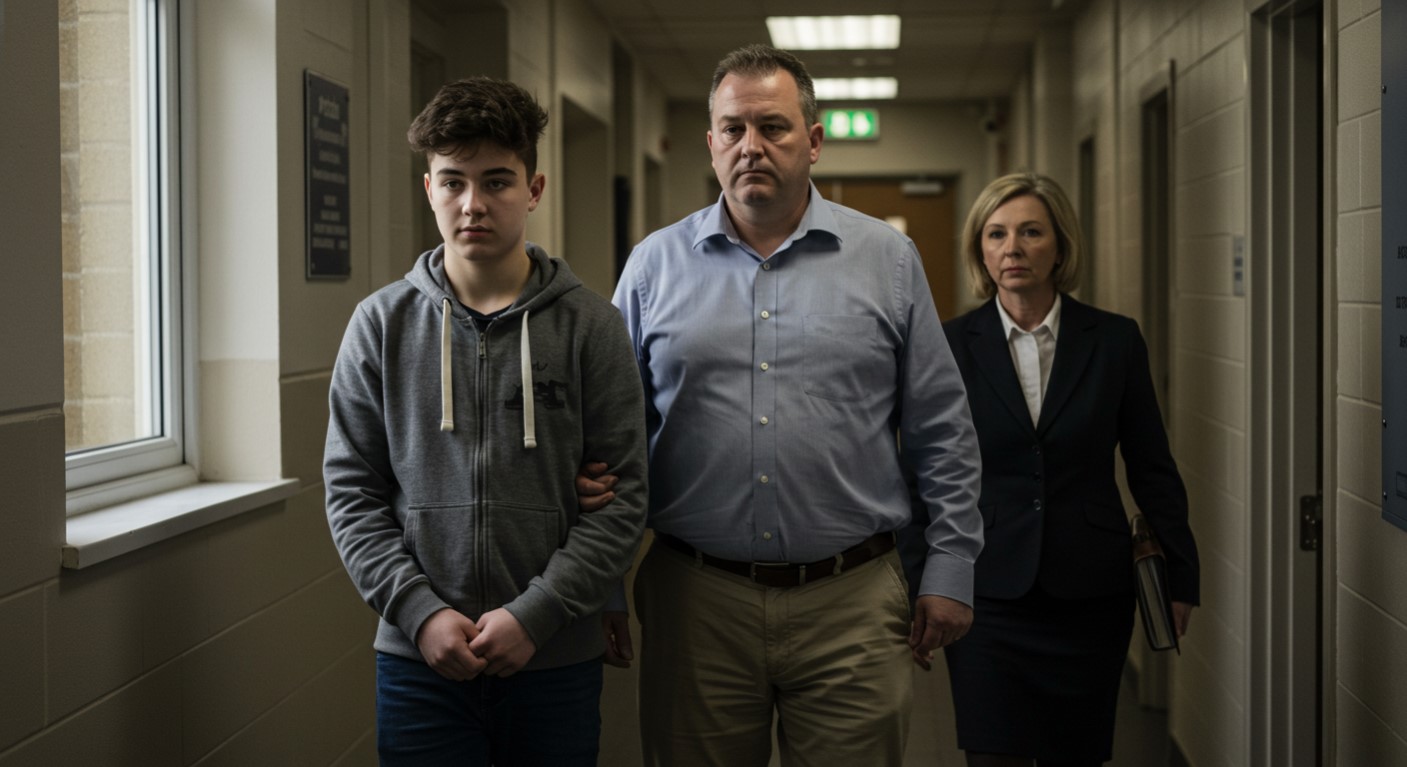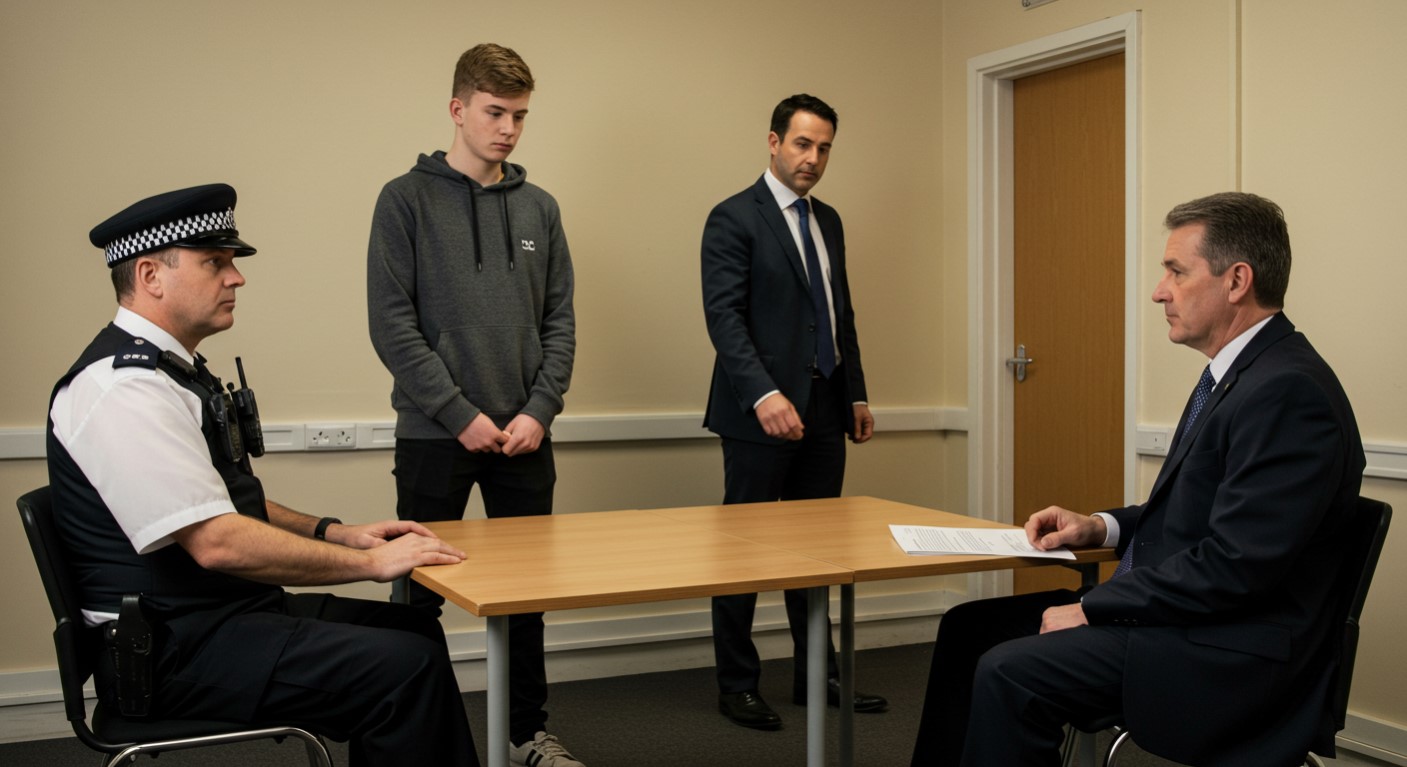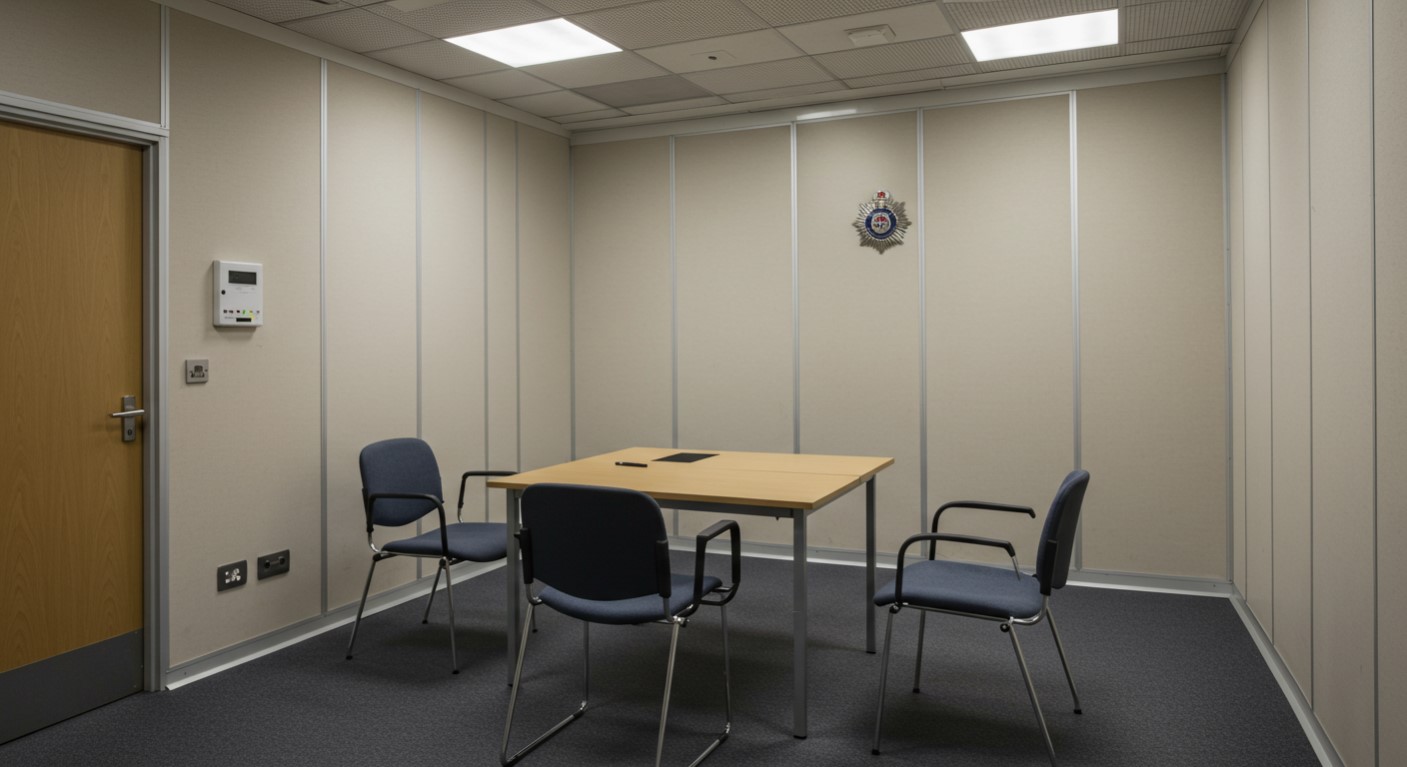What Are My Rights when Being Interviewed at A Police Station in England and Wales?

What Are My Rights when Being Interviewed at A Police Station in England and Wales?
Being interviewed at a police station can be a daunting experience, but it’s important to understand your rights to ensure a fair and just process. In England, there are specific rights when being interviewed at a police station. These rights are designed to protect your interests and ensure a balanced and transparent investigation.
Specific Rights at A Police Station Interview

Here are some key rights you should be aware of when contacted by a police for an interview:
1. Right to Legal Representation: You have the right to legal representation during the interview. This means you can have a solicitor present to provide legal advice and support.
2. Right to Remain Silent: You have the right to remain silent and not answer any questions that may incriminate you. This is known as the “right to silence” and is a fundamental principle of the criminal justice system.
3. Right to be Informed of the Nature of the Interview: Before the interview begins, the police should inform you of the nature of the interview and the offenses they suspect you of committing. This allows you to understand the context and respond accordingly.
4. Right to Request Breaks: During the interview, you have the right to request breaks. This is to ensure that you have time to consult with your legal representative, gather your thoughts, or attend to any personal needs.
5. Right to Access Legal Advice: You have the right to access legal advice before and during the interview. This means you can consult with your solicitor to seek guidance and ensure you understand your rights and obligations.
During a Police Station Interview
During a police station interview, it is important to know how to conduct yourself. Here are some recommended actions:
1. Remain Calm and Composed: Stay calm and composed throughout the interview. This will help you think clearly and respond appropriately.
2. Listen Carefully and Seek Clarification: Pay close attention to the questions being asked and seek clarification if you are unsure about anything. It’s important to fully understand the questions before providing an answer.
3. Exercise Your Rights Appropriately: Exercise your rights, such as the right to remain silent and the right to legal representation, when necessary. However, also be aware that cooperation and providing truthful information can be beneficial in certain circumstances.
4. Answer Truthfully and Honestly: If you choose to answer questions, provide truthful and honest responses. Providing false information can have serious consequences.
Aftermath of A Police Station Interview

After a police station interview, several outcomes are possible. These include:
1. Release without Charge: If there is insufficient evidence or no grounds for further action, you may be released without charge.
2. Release under investigation: Usually, people released under investigation have been interviewed by the police under caution, but there are not sufficient grounds to charge them. However, the police do not want to dismiss them as a suspect yet as they require more time to conduct investigations.
2. Conditional Release: You may be released on certain conditions, such as bail or other restrictions, pending further investigation.
3. Charge and Bail: If there is evidence to support criminal charges, you may be charged and released on bail. Bail conditions may be imposed to ensure your attendance at future court proceedings.
4. Charge and Detention: In more serious cases, you may be charged and detained in custody until a court appearance.
Understanding your rights and knowing how to navigate a police station interview can help protect your interests and ensure a fair process. It is always recommended to seek legal advice if you have any concerns or questions during this process.
What Are Your Rights When Being Interviewed at a Police Station?
When you find yourself being interviewed at a police station in England and Wales, it’s crucial to be aware of your rights. In this section, we will explore what those rights entail and how they protect you during the interview process.
From the right to legal representation and remaining silent to being informed of the nature of the interview, we will unravel the essential rights you have. We will discuss your right to request breaks and access legal advice when needed. It’s important to understand these rights to ensure a fair and just experience.
Right to Legal Representation
During a police station interview, individuals have the right to legal representation. This means that they can have a lawyer present during the interview to provide advice and support. Having legal representation can be crucial in protecting an individual’s rights and ensuring a fair process.
It allows them to have someone knowledgeable about the legal system who can assist in understanding the nature of the interview and navigating through it effectively. The right to legal representation helps to ensure that individuals are treated fairly and have the opportunity to present their case properly.
Right to Remain Silent
When being interviewed at a police station individuals have the right to remain silent, ensuring they do not incriminate themselves. This right to remain silent is crucial in ensuring a fair and just legal process. By exercising this right to remain silent, individuals can protect themselves from self-incrimination and potential harm to their case.
It is important to remember that this right to remain silent is not an admission of guilt; it is a legal protection that can be utilised if desired. By remaining silent during a police station interview, individuals can seek legal advice and guidance to navigate the legal process effectively.
Right to be Informed of the Nature of the Interview
During a police station interview , individuals are entitled to exercise their right to be informed of the nature of the interview. This means that they should receive an explanation of why they are being interviewed and what it entails. Understanding the purpose of the interview is crucial for individuals to effectively exercise their rights and provide accurate and relevant information.
By being informed about the nature of the interview, individuals can better prepare themselves, seek appropriate legal advice, and ensure that their rights are protected throughout the process.
Right to Request Breaks

During a police station interview , it is important to exercise your right to request breaks in order to ensure your well-being and facilitate effective communication.
- Begin by politely asserting your right to a break if you require time to gather your thoughts or attend to personal needs.
- Utilise these breaks to consult with your legal representation so that you can fully comprehend the interview process and understand your rights.
- Take advantage of these pauses to gather yourself mentally and emotionally, recognising that interviews can be inherently stressful.
- Be mindful to use your breaks wisely, as excessive or unnecessary requests may impede the progress of the interview.
- Always bear in mind that the right to request breaks has been established to safeguard your rights and ensure a fair and respectful interview process.
Right to Access Legal Advice
During a police station interview , individuals have the right to access legal advice, which is crucial. This means that they can seek assistance from a lawyer to ensure their rights are protected and to receive guidance on how to navigate the interview process.
The right to access legal advice is of utmost importance as it allows individuals to understand the legal implications of the questions asked and the potential consequences of their responses.
Furthermore, it helps them make informed decisions about whether to answer certain questions and how to present their case effectively. This essential right ensures fairness and safeguards the individual’s interests during the interview.
What Should You Do During a Police Station Interview?

During a police station interview, it’s crucial to know what steps to take. Stay calm and composed, listen carefully, and seek clarification when necessary. Exercise your rights wisely and answer truthfully and honestly. These actions can greatly influence the outcome of the interview. Remember, being well-prepared and aware of your rights can make a significant difference in this critical situation.
Remain Calm and Composed
Remaining calm and composed during a police station interview is crucial. Here are a few tips to help you maintain your composure:
- Stay focused and centered, taking deep breaths to calm your nerves.
- Listen attentively to the questions being asked and seek clarification if needed.
- Remember your rights and exercise them appropriately, such as the right to remain silent or to request breaks.
- Answer truthfully and honestly, providing concise and clear responses.
By remaining calm and composed, you can present yourself in a confident and collected manner, ensuring that the interview proceeds smoothly and effectively.
Listen Carefully and Seek Clarification
During a police station interview, it is of utmost importance to listen carefully and actively seek clarification to ensure complete understanding. Pay close attention to the questions being asked and if there is any uncertainty, do not hesitate to ask for further clarification. This proactive approach will help to avoid any misunderstandings and guarantee that your responses are accurate. By attentively listening and seeking clarifications, you will demonstrate your cooperation and dedication to providing precise information. Always remember that answering truthfully and honestly is paramount, but it is equally essential to fully comprehend the questions being presented.
Exercise Your Rights Appropriately
During a police station interview, it is of utmost importance to exercise your rights appropriately. This includes:
1. Remaining calm and composed: Stay focused and composed throughout the interview to ensure clear communication and understanding.
2. Listening carefully and seeking clarification: Pay close attention to the questions asked and, if necessary, request clarification.
3. Exercising your rights: Familiarise yourself with your rights, such as the right to legal representation and the right to remain silent, and employ them when necessary.
4. Answering truthfully and honestly: Provide precise and honest information based on your best knowledge.
By exercising your rights appropriately, you can safeguard yourself during a police station interview.
Answer Truthfully and Honestly
During a police station interview , it is crucial to respond truthfully and honestly. Answering the questions in this manner is essential for upholding your credibility and avoiding potential legal consequences. It is important to stay calm and composed, actively listen to the questions, and ask for clarification if needed. It is also important to exercise your rights appropriately, including the right to remain silent and the right to have legal representation present. By providing truthful and honest responses, you contribute to a fair and transparent legal process. Keep in mind that providing false information can result in serious charges and further complications.
What Can Happen after a Police Station Interview?

- Release Without Further Action:
After a police station interview, one possible outcome is the release of the individual without further action. This means that the police do not have enough evidence to proceed with charges or that they believe the evidence is insufficient to secure a conviction.
Release without further action is a positive outcome for the interviewed individual, as it signifies that they will not face charges or court proceedings related to the specific incident. However, it’s essential to remember that the police can reopen an investigation if new evidence emerges.
- Release on Bail:
In some cases, individuals may be released on bail after a police station interview. Bail is a legal process that allows the individual to be released from police custody but under certain conditions. These conditions may include restrictions on travel, reporting to a police station at specified times, or refraining from contacting specific individuals or visiting certain locations.
Being released on bail indicates that the police believe there is enough evidence to warrant further investigation but not enough to warrant immediate charges. Individuals on bail are required to attend subsequent police interviews or court appearances as scheduled.
- Charge:
If the police have gathered sufficient evidence during the interview and investigation, they may choose to charge the individual with a criminal offense. When an individual is charged, they will be provided with a document known as a Charge Sheet, which outlines the specific offense they are accused of committing.
Being charged marks the formal beginning of criminal proceedings against the individual. They will be required to appear in court to answer the charges and may choose to seek legal representation at this stage.
- Conditional Caution or caution with no conditions:
In some cases, the police may offer an individual a conditional caution after a police station interview. A conditional caution is a formal warning that comes with specific conditions, such as attending rehabilitation programs or making amends to victims.
Accepting a conditional caution means admitting guilt for the offence in question. While it avoids the need for a court trial, it results in a criminal record. Individuals should carefully consider the implications of accepting a caution and seek legal advice.
Frequently Asked Questions
1. What are my rights when being interviewed at a police station in the UK?
When being interviewed at a police station in the UK, you have certain rights:
- You have the right to free legal advice from a duty solicitor or a specific legal adviser. This advice can be given in person or over the phone, and you can change your mind about wanting legal advice.
- The police must provide you with your rights in writing and in your first language.
- You can ask the police to contact someone to let them know you are at the police station, and if you are not from the UK, you can ask them to contact your embassy or consulate.
- If you need medical help, you should inform the police, and they will arrange for a healthcare professional to see you free of charge. You may also be allowed to take your own medicine, but it will need to be checked by the police.
- The police must follow rules outlined in the Police and Criminal Evidence Act 1984 (PACE 1984) and the PACE codes of practice. You have the right to see these codes while at the police station.
2. Do I have the right to remain silent during a police interview?
Yes, you have the right to remain silent during a police interview. You do not have to answer any questions that may incriminate you. However, it is important to seek legal advice to understand the potential implications of remaining silent.
3. What should I do if I have been invited for a voluntary police interview?
If you have been invited for a voluntary police interview, it is crucial to obtain as much information as possible about the allegations and seek advice from a specialist legal team. They can guide you on whether to answer police questions and protect your interests during the interview.
4. Can the police arrest me if I refuse to attend a voluntary police interview?
Yes, if you refuse to attend a voluntary police interview, the police may decide to arrest you instead. It is not advisable to simply refuse without seeking legal advice first.
5. What are the potential outcomes of a voluntary police interview?
Depending on the outcome of a voluntary police interview, you may be arrested and charged or summoned to attend court. It is essential to have expert legal representation to ensure your defense and increase the chances of obtaining no further action.
6. Why is it important to have a specialist legal team during a voluntary police interview?
Having a specialist legal team during a voluntary police interview is crucial because bad advice at the police station can work against you. They can provide proactive work and advice to protect your interests, ensure respect for your rights, and prevent any statements that could harm your defence.
Notice: Informational Content Disclaimer
The content provided on this website, including articles, blog posts, and other informational materials, is intended for general informational purposes only. It is not intended as, and should not be considered, legal advice.
Visitors to this website should be aware that the information presented here is not a substitute for seeking legal advice from a qualified solicitor or legal professional. Each individual's legal situation is unique, and the information provided may not be applicable to specific circumstances.
If you require legal advice or have specific legal questions, we encourage you to contact us directly. Our experienced team of solicitors is here to assist you with your legal needs and provide tailored advice to address your concerns.
Please be advised that any communication through this website, including the use of contact forms or email, does not create a solicitor-client relationship. Confidential or time-sensitive information should not be sent through this website. To establish a solicitor-client relationship and discuss your legal matters in detail, please contact us for a consultation.
We strive to provide accurate and up-to-date information, but we make no representations or warranties regarding the accuracy, completeness, or suitability of the information contained on this website. We shall not be liable for any reliance placed on the information provided herein.
Thank you for visiting our website. We look forward to the opportunity to assist you with your legal needs.




